
Currently at Rio Hondo, AI has come into popularity and many people are questioning its impact. Some of the concerns of educators have been how it will affect the school atmosphere. AI refers to the simulation of human intelligence in machines and computer systems. In shorter terms, AI is a tool that can identify patterns and make predictions or recommendations based on the data that it is provided. The discussion with educators as well as their opinions on AI were gathered. From Professors’ expertise ranging in subjects from English, Psychology, and Communications, it was important to get their point of view on AI.
Professor Michael Koger, from the English Department, educator of 13 years. Shares that he has noticed a difference in students’ ability and willingness to learn. When asked if tech platforms or social media platforms might also be responsible for students’ decreased attention spans, he states,
“We’ve created this environment where we now lack the capacity to be patient. As educators, we’re competing against all of that technology and fighting for attention. AI should be used as a tool, and not a replacement for learning.” However, it was noted that some students will automatically seek the path of least resistance and oftentimes take it.
Professor Francisco L. Sotelo, from the Science Department, educator of almost nine years. Shares his outlook on how humans frequently adapt to the changes of the world around them. He states:
“So as the world changes, as technology changes, as the needs of students change, you adapt. You adapt to what you guys do, and how you think or how you interact with each other. So I think that we’re just adapting to new ways of communicating and new technology. It’s just a different-looking world.” In this instance, AI is seen as the new technology that humans will adapt to, like everything else.
Professor Alexandre Dejean, from the Communications Department, educator of 10 years; shares his goal of being a communications studies instructor is to help students become better communicators and teach students how to build relationships and apply those in academic settings. When asked if he was pro AI or against it, he says:
“I’m very Pro-AI, and I like using AI tools to help students build their writing skills, and just having them debate with an AI chat box. Versus, some students I know will just use AI to write an essay for them because they don’t know how to use it correctly. So I think technology can be in favor of teachers and students as an educational tool.”
Each Professor voiced that AI is essentially a tool, but there was a clear undertone that there needs to be boundaries with using tools as powerful as these. Artificial Intelligence can be used correctly and according to the subject of the classes, but could also be a possible threat to educators if there are not clear boundaries distinguished between learning and copying. Many of the educators believe that there is a downside to AI, and they worry about students taking advantage of not using it properly in an academic setting; they may be competing against people’s instincts to do the easiest things.


